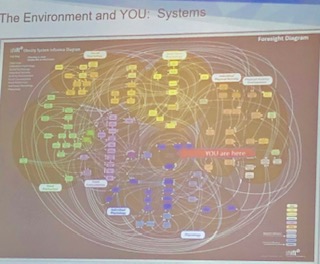I attended a conference session, sponsored by Dupont earlier this year about weight loss and weight maintenance, presented by obesity expert Dr. James Hill.
Obesity is a popular topic of discussion among exerts and non-experts alike. There’s no shortage of opinions about both the causes and best treatments. I agree completely with Dr. Hill – we continue to want to blame one thing for the obesity epidemic, when in fact there may indeed be over 100 factors.

This busy diagram gives a visual for how complicated obesity is.
Dr. Hill has a PhD in physiological psychology and has served as President of the American Society for Medicine (ASN) in 2008-9. He was also President of The Obesity Society (TOS) in 1997-8; Chair of the first World Health Organization Consultation on Obesity in 1997; and a member of the NIH Expert Panel on Obesity that developed the first U.S guidelines for the treatment and prevention of obesity. Dr. Hill has published more than 600 scientific articles and book chapters, and he’s currently Director of the University of Alabama Nutrition Obesity Research Center. So yeah, he knows a thing or two about obesity. People can learn more about the weight management programs he developed at www.stateofslim.com. I love their tagline:
Most of our daily behavior is automatic – we don’t really think much about it. State of Slim will help you replace the automatic behaviors that are keeping you overweight and unhealthy with new ones that make it easier for you to maintain a healthy lifestyle.
I had the chance to interview Dr. Hill about some key thoughts about weight loss and weight maintenance, and what he has found to be successful for people.
RR: Why do you recommend a high protein, low carbohydrate diet for weight loss?
JH: A substantial amount of research has shown that high protein diets usually lead to more weight loss than lower protein diets. We have found this in our research. We do not know exactly why. I think it is probably because the higher protein diet makes you feel fuller and this helps you better stick with your diet plan. Initially we restrict amount and type of carbohydrate (stressing veggie intake, reducing sugar intake). However, as people add more exercise into their lives, we increase both amount and type of carbohydrate (still limiting sugar).The more you exercise, the more carbohydrate you can add to your diet without promoting weight regain. We also tell people that they should get very few (or zero) calories from beverages and most from foods.
RR: For those who are trying to lose weight on their own, what sorts of high protein foods do you recommend? Do you recommend avoiding some foods?
JH: We have conducted research to compare animal vs plant protein in a high protein weight loss diet. Both contribute to weight loss equally well – so you have a choice. You can be a vegetarian or you can include meat. For the latter we recommend non-fatty fish and lean cuts of meat.
RR: You say people have to fix their “broken metabolism”. Do you have some encouraging words for my readers?
JH: MOVE YOUR BODY. Your metabolism becomes broken (less metabolically flexible) when you quit moving and this puts you at risk for obesity and obesity-linked chronic diseases such as diabetes and heart disease. You can best fix your metabolism by starting to move your body again – becoming an exerciser. Then your metabolism is working for you, not against you in your efforts to maintain a healthy weight. Exercising is one of the best things you can do for your health. You don’t need to exercise to lose weight, only to keep it off permanently. We recommend about an hour a day of exercise. Now don’t panic, you just need to give up one TV show each day. If it is important for you (and it is essential for keeping weight off), you can find the time.
RR: Why is it important for people to understand that weight maintenance shouldn’t use the same strategy as weight loss?
JH: You can lose weight on any diet as long as you reduce your total energy intake. For example, several studies have shown similar weight loss on low carb and low fat diets. But most people can’t stick with either over the long term. Weight loss is short term and you can do just about anything for a while. Keeping weight off is very different. First, exercise becomes essential and is the most important factor. It improves your metabolism but also allow you to eat an amount that is more satisfying than if you don’t exercise. Our research shows that people who are most successful over the long-term eat a relatively low fat diet, high carb diet. This only works if you exercise to burn the carbs. Keeping weight off is forever, so you have to find a diet and exercise program that you can stick with.
The Key Takeaway
The diet for weight loss is not the same as the diet for weight maintenance. As Dr. Hill suggests, many people can make a change in their diet for the short-term. It’s the long term that counts, and is most challenging. His recommendation for weight loss, is a short term high protein, low carbohydrate diet (limiting caloric beverages, sugars, starches). Carbohydrates can be gradually added to the diet as exercise increases, and then the maintenance plan is higher in carbohydrate, but still adequate in protein (yes, DASH Diet would fit this bill). There’s no question that movement is important to keep our metabolism optimal. Exercise needs to continues through weight maintenance! Start slowly, and find types of exercises you enjoy.




